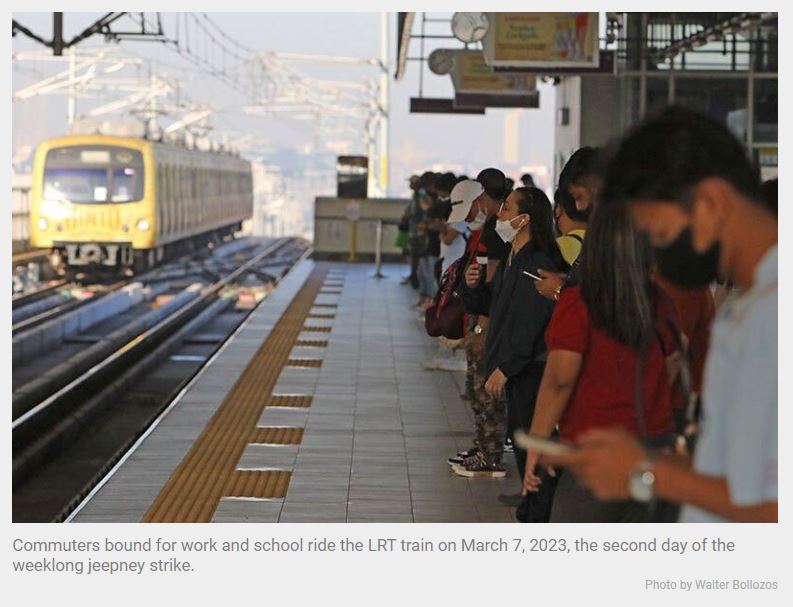Philippines: Wage board approves P40 hike in minimum wage in Metro Manila
MANILA, Philippines (Update 2, 8:42 p.m.) — The regional wage board in the National Capital Region has approved a P40 increase in the minimum wage, bringing it to P610 a day for non-agriculture workers, the Department of Labor and Employment.
The increase granted is less than half of the P150 across-the-board daily minimum wage hike inching forward in the Senate and brings the minimum wage in the capital to within P140 of the P750 daily national minimum wage that labor groups are campaigning for.
“The new rates, which translate to a 7% increase from the prevailing daily minimum wage rates in the region, remain above the regional poverty threshold of P452 per day for a family of five,” DOLE said in a statement first posted by ABS-CBN News.
The labor department said around 1.1 million minimum wage earners in NCR will directly benefit from the increase.
Around 1.5 million full-time wage and salary workers earning more than the minimum wage could indirectly benefit as well because of salary adjustments, it said.
DOLE said the National Wages and Productivity Commission affirmed the wage order last Tuesday and approved it for publication in major newspapers on June 30.
In a statement Thursday, labor group Kilusang Mayo Uno acknowledged the victory for workers’ groups but also said the increase is less than half what workers had asked for.
“We salute the workers in the National Capital Region for persevering and fighting for this increase,” KMU said in a statement in Filipino. “This is not from the kindness of the Marcos Jr. administration but from our own efforts to advance our fight.”
In an interview on TeleRadyo, Carlos Oñate, legislative officer of Trade Union Congress of the Philippines, said the group is “gravely disappointed” by the increase granted. He said that, because of inflation, the purchasing power of the current P570 minimum wage is lower by P88. TUCP, which has a seat at the House of Representatives, is pushing for a P150 increase in the minimum wage through legislation.
“If you look at wage orders… historically, particularly in the NCR, the wage increases have been too small.”
Sergio Ortiz Luis of the Employers Confederation of the Philippines, in a separate interview on TeleRadyo, said that the increase granted was the most fair. He said that based on the formulas used to determine the wag increases, the increase would have been between P31 to P37.
ECOP has been calling for government support to employers, especially smaller businesses, to help keep them operating and providing jobs.
Wage Order No. NCR-24, which also raises the minimum wage for agricultural workers in mostly urban Metro Manila to P573, takes effect on July 16.
Among the bases for setting a regional minimum wage are “the demand for living wages” as well as changes in the cost of living and the needs of workers and their families.
Wage boards also have to ensure that minimum wages take into account “the need to induce industries to invest in the countryside”, the effects it will have on employment generation, and the “fair return of the capital invested and capacity to pay of employers.”
Exemptions
Businesses that employ fewer than 10 workers and those affected by calamities or human-induced disasters my seek exemptions from the Regional Tripartite Wages and Productivity Board for NCR, DOLE said.
Barangay micro-business enterprises — those engaged in production, processing and manufacturing, trading and services and with total assets of P3 million or less — are exempted from the minimum wage increase by law.
DOLE said the latest increase was prompted by labor groups who filed petitions for a wage hike “due to escalating prices of basic goods and commodities.”
Wages can be increased through petitions by workers, by law, and through collective bargaining agreements between unions and management.
Unions score ‘anti-worker policies’
The wage increase was announced on the same day that labor coalition All Philippine Trade Unions released a joint statement saying “for far too long, Filipino workers have been the underdog victims of anti-worker policies which continue to dilute their freedom of association and right to organize.”
Among the issues raised by APTU — which includes KMU, Trade Union Congress of the Philippines, Bukluran ng Manggagawang Pilipino, Federation of Free Workers and Nagkaisa! Labor Coalition — at a press conference on Thursday were reports of attempts to pressure workers to vote against unionizing, attempts to equate union organizing with terrorism, and violence against union and labor leaders and organizers.
APTU said the Philippines is among 22 countries with ongoing cases of violations of International Labour Organization conventions on fundamental labor rights.
The coalition said the Philippines’ commitment to ILO Convention No. 87 on freedom of association has been the subject of three high-level ILO visits since 2009, with the latest in January of this year.
The unions also scored the creation of the Inter-Agency Committee for the Protection of the Freedom of Association and Right to Organize of Workers for not having any representatives from workers’ groups. They said that “unaddressed anti-union violence” and an alleged lack on substantive action on these issues show a “lack or absence of sincerity and genuine engagement” from government. — Jonathan de Santos
Source: https://www.philstar.com/headlines/2023/06/29/2277514/wage-board-approves-p40-hike-minimum-wage-metro-manila


 English
English




